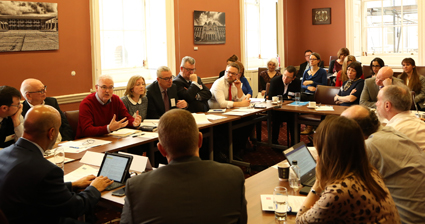European Police Cooperation after Brexit
The withdrawal of from the European Union will redefine the UK’s relationship with Europe and the rest of the world across a multitude of areas. As the government prepares to trigger Article 50 at the end of the month, experts in the field of security cooperation convened at The Dickson Poon School of Law to discuss the implications of Brexit and what the future held for the UK and Europe in this regard.
Academics, policy-makers and practitioners discussed a range of questions about operational practice, training, oversight and accountability. Of particular interest were the future of UK involvement – which is now far from certain - in Europol, the European Arrest Warrant, the Schengen Information System, the European Criminal Records Information System and the European Investigation Order.
 Delegate discussion at the European Police Cooperation after Brexit event
Delegate discussion at the European Police Cooperation after Brexit event
In the morning, the group heard from Mr Matthew Burton, Head of UK International Crime Bureau National Crime Agency (UKICB NCA), followed by a talk Brandon Lewis MP, Home Office Minister of State for Policing and the Fire Service. Rob Wainwright, Director General of Europol delivered the keynote talk of the afternoon.
The event also included two lively round-table sessions, which examined the range of issues relating to Police cooperation in Europe post-Brexit.
The first of the sessions facilitated discussions among practitioners, NGO’s and policy makers on the implications for law, policy and practice. Academic experts also took part, raising practical points. Four main questions were explored during this session: What does the UK stand to lose? What does the EU stand to lose? What are the implications of this for the current position? And what are the options moving forward?
The second round-table focused on the implications for future research, education and training, which facilitated interaction between academics and NGOs with practical input from practitioners and policy makers. Discussion during this session focused on: What are the implications for teaching and research? What avenues of future research arise? What should research priorities be? How can academics, NGO’s, practitioners and policy makers work together to these ends?
Among the attendees were representatives from the College of Policing, the National Crime Agency, Eurojust, the Police Foundation, the Crown Prosecution Serivce (CPS), the Crown Office and Prosecutor Fiscal Service and UK police forces.
Professor Ben Bowling, Executive Dean in The Dickson Poon School of Law and who convened the event said: ‘Police, security and justice should be the very highest priority as the UK moves towards exiting the European Union. Nothing less than the safety and liberty of the general public are at stake. This workshop brought to light just how complex the decisions about policing and security cooperation after Brexit are going to be.’
There will be a follow up event in May, funded by ESRC and the Dickson Poon School of Law. This event will focus on the future of the European Arrest Warrant in the UK and will engage practitioners from across the criminal justice sector as well as law and policing experts.
This event was part of the School’s Thought Salon series of events funded by the Dickson Poon gift.
Photographs from the event are available on the School’s Flickr pages.